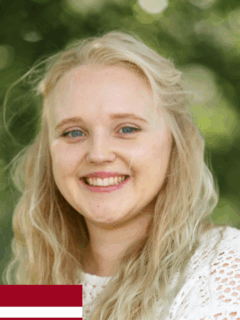Anna Rubīna
Visiting PhD student (BBCE, Riga Technical University, RTU, Latvia)
Injectable composite hydrogels for infection treatment and bone healing
Supervisor at RTU: Prof. Kristine Salma-Ancane
Supervisor at FAU: Prof. Aldo R. Boccaccini
Bone infections can lead to severe tissue defects and necrosis. Current treatments typically involve surgical removal of the infected tissue combined with antibiotic therapy [1]. However, antibiotics can be ineffective due to the emergence antimicrobial resistance [2]. Therefore, novel non-antibiotic biomaterial-based strategies for bone infection treatment and tissue regeneration are urgently needed. Ion-doped mesoporous bioactive glass nanoparticles (MBGNs) exhibit strong bioactivity and inherent antibacterial properties [3]. Combining MBGNs with an injectable chitosan and antimicrobial polypeptide-based hydrogel system could yield an innovative non-antibiotic composite material with synergistic dual functionality, namely antibacterial activity and bone tissue regenerative potential. The project is part of a collaboration of our Institute with the Baltic Biomaterials Center of Excellence (BBCE).
1. Wang, X. et al. Flourishing Antibacterial Strategies for Osteomyelitis Therapy. Adv Sci (Weinh) 10, (2023).
2. Antimicrobial resistance. https://www.who.int/news-room/fact-sheets/detail/antimicrobial-resistance.
3. Pantulap, U., Arango-Ospina, M. & Boccaccini, A. R. Bioactive glasses incorporating less-common ions to improve biological and physical properties. J Mater Sci Mater Med 33, 1–41 (2022).

